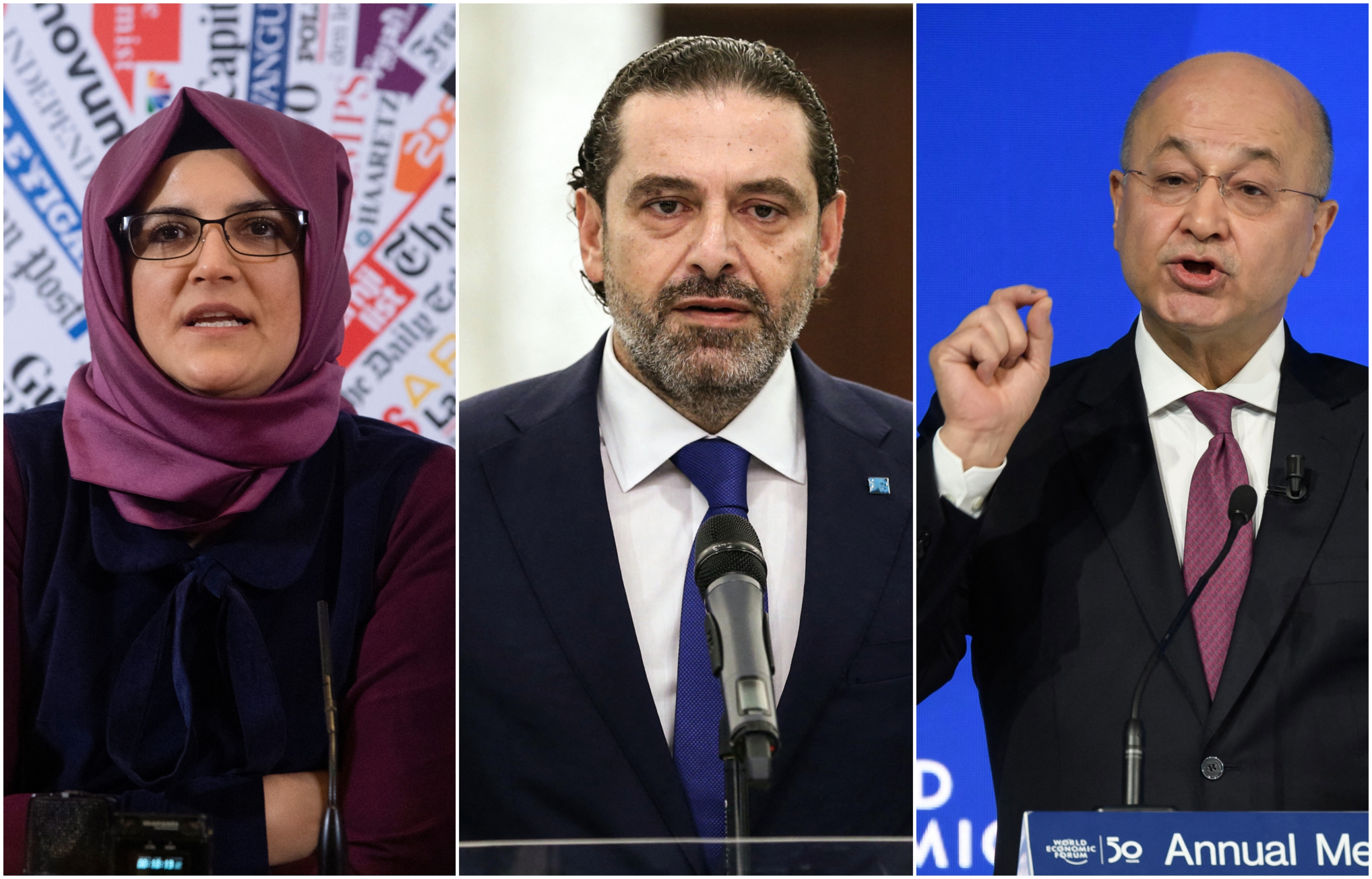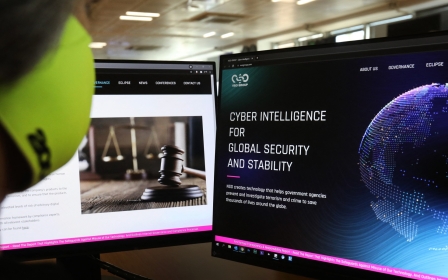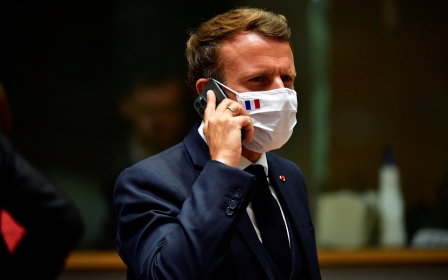Pegasus: Which Middle East and North Africa figures are on the target list?

The revelations this week that the Pegasus surveillance software developed by Israel's NSO Group could have been used to hack around 50,000 phones has shocked much of the world.
Although NSO Group has repeatedly denied that its software is used to target dissidents and journalists - and has said the original Forbidden Stories report on the leaks had "no factual basis" - the appearance of the numbers of hundreds of reporters, activists, politicians and even heads of state among the list acquired by a consortium of journalists has been alarming for many.
In the Middle East and North Africa, where many states are no stranger to using repressive and invasive methods against their citizens, there have been numerous high-profile figures whose numbers are listed as targets.
Middle East Eye has compiled a list of some of those who have either been targeted in the past or whose numbers are known to have been in the latest leaks:
Iraq
New MEE newsletter: Jerusalem Dispatch
Sign up to get the latest insights and analysis on Israel-Palestine, alongside Turkey Unpacked and other MEE newsletters
Barham Salih, president of Iraq
Salih's number was added to the Pegasus list in 2019, a year after he assumed the presidency of Iraq. Both Saudi Arabia and the UAE are believed to have selected Salih as a candidate of interest to their governments.
Ali al-Sistani, senior Shia cleric
Sistani, the most senior Shia cleric in Iraq, was selected as a candidate of interest by the UAE between 2017 and 2019, according to the website Daraj.
Mustafa al-Kadhimi, prime minister of Iraq
Kadhimi was, according to Daraj, targeted as a candidate of interest by the UAE while he was head of the Iraqi National Intelligence Service between 2016 and 2020.
Ammar al-Hakim, Shia cleric and politician
Hakim, leader of the Hikmah movement in Iraq, was selected as a candidate of interest by the UAE between 2017 and 2019, according to the website Daraj.
Masrour Barzani, prime minister of Kurdistan Regional Government
The premier of Iraq's Kurdish region had his phone targeted by the UAE for 18 months, according to Daraj.
Turkey
Hatice Cengiz, academic and fiancee of Jamal Khashoggi
Cengiz is an academic and fiancee of Saudi journalist Jamal Khashoggi, who was killed in the Saudi consulate in Istanbul in October 2018. Four days after his assassination, according to Amnesty International's Security Lab, her iPhone was successfully infected with the Pegasus software and over subsequent days targeted multiple times.
Yasin Aktay, journalist and aide to President Erdogan
A columnist for the pro-government newspaper Yeni Safak and an advisor to Turkish President Recep Tayyip Erdogan, Aktay was also known as a close friend of Jamal Khashoggi. His phone number appeared on the Pegasus list and he told the Washington Post that he had been informed by Turkish intelligence that his phone had been hacked shortly after Khashoggi's murder.
Irfan Fidan, former Istanbul chief prosecutor
Fidan's phone was targeted while he was the public prosecutor in charge of the investigation into the death of Khashoggi, the Guardian reported.
Morocco
Mohammed VI, king of Morocco
According to French media, King Mohammed VI was selected as a person of interest in 2019, seemingly by his country's own security forces. NSO Group has publicly stated that Mohammed had "never" been a target of their operations.
Saadeddine Othmani, prime minister of Morocco
Othmani was selected as a person of interest in 2018 and 2019, apparently by elements within his own country, French media said.
Taoufik Bouachrine, journalist and editor
Bouachrine, editor of Akhbar al-Yaoum, was selected for surveillance with the Pegasus spyware from 2017 to 2018, according to Forbidden Stories. His wife, Asmae Bouachrine, was also selected from 2017 to 2019.
Hicham Mansouri, journalist
According to Forbidden Stories, Mansouri's phone was compromised around 20 times by Pegasus spyware between February and April 2021. Mansour, co-founder of the Moroccan Association of Investigative Journalists, was previously imprisoned in Morocco in 2015 after a raid on his home, before later claiming asylum in France.
Omar Radi, journalist
In June 2020, an investigation by Amnesty International revealed that NSO Group spyware had been used against Radi, a prominent journalist and human rights activist. Amnesty’s report said the targeting of Radi happened three days after NSO released a new human rights policy. Radi was jailed on 20 July 2021 for six years on sexual assault and espionage charges, accusations which he denies.
Bahrain
Sayed Alwadaei - pro-democracy activist
The London-based director of the Bahrain Institute for Human Rights (BIRD) was selected for targeting by a customer understood to be the UAE in 2018, according to the Guardian.
Lebanon
Saad Hariri, former prime minister of Lebanon
Hariri, who last week resigned as prime minister-designate, was apparently selected by the UAE as a candidate of interest in 2018 and 2019, Le Monde said.
Michel Aoun - President of Lebanon
According to Le Monde, the Lebanese president was selected as a candidate of interest by Saudi Arabia in 2019.
Roula Khalaf, editor of the Financial Times
The Lebanese-British editor-in-chief of the Financial Times in London was selected as a potential target throughout 2018. A lawyer for NSO Group said there had been no attempted or successful Pegasus infections of her phone, according to the Guardian.
Samir Geagea, political leader
The head of the Lebanese Forces political party and former warlord was selected as a candidate of interest by Saudi Arabia in 2019, according to Le Monde.
Wafik Safa, Hezbollah security chief
The number of Hezbollah's security chief - along with the numbers of several other members of the movement - was targeted in 2017 by the UAE.
Egypt
Hanan Elatr, wife of Jamal Khashoggi
Six months before the death of her husband, Elatr's Android phone was targeted by a Pegasus user. But, according to the Washington Post, it could not be analysed whether the hack was successful. Elatr was sent four text messages containing malicious links between November 2017 and April 2018.
Mostafa Madbouly, prime minister of Egypt
Madbouly, who was appointed prime minister of Egypt in June 2018, was selected for targeting by Saudi Arabia the following year, Daraj reported.
Palestine
Azzam Tamimi, activist
British-Palestinian activist Tamimi said he was told by a journalist that leaked documents indicated that both Saudi Arabia and the UAE may have hacked his phone. He said he believed the alleged hacking after the murder of his friend Jamal Khashoggi was an attempt to spy on the international movement seeking justice for the journalist.
Wadah Khanfar, former director-general of Al Jazeera
The former Al-Jazeera chief and close friend of Khashoggi was successfully targeted by Pegasus, with analysis showing that his phone was infected as recently as July 2021.
Saudi Arabia
Abdullah Khashoggi, son of Jamal Khashoggi
According to Forbidden Stories, Abdullah was selected as a target of an NSO client that seemed to be the UAE, several weeks after the death of his father.
Madawi al-Rasheed, academic
Rasheed, who writes for Middle East Eye and helped found a Saudi opposition party in exile, said there had been an unsuccessful attempt to hack her phone in April 2019.
Yahya Assiri, opposition activist
UK-based Saudi activist Assiri said he had been told that evidence suggested he was hacked by both Saudi Arabia and the UAE in March or April 2019. The activist, who documents human rights violations in Saudi Arabia, has also been hacked at least two other times - in 2018 and 2020 - and said he has regularly had his phone checked.
Omar Abdulaziz, opposition activist and video blogger
Citizen Lab said in October 2018 that the Pegasus software had infected the phone of Abdulaziz, a Saudi opposition figure and friend of Jamal Khashoggi based in Canada. In December that same year, Abdulaziz filed a lawsuit against NSO Group, alleging the company had helped the Saudis spy on his communications with Khashoggi.
United Arab Emirates
Ahmed Mansoor, human rights activist
According to a report by Citizen Lab and Lookout Security, the United Arab Emirates was found in 2016 to be tracking the iPhone of Emirati human rights activist Ahmed Mansoor using Pegasus spyware. Mansoor, a prominent advocate for reform in the UAE, has been in jail in the country since 2017.
Alaa al-Siddiq, human rights activist
The London-based Siddiq, who is executive director of the pro-democracy ALQST organisation alongside founder Yahya Assiri, was listed in the data in 2018. Siddiq was killed in a car crash in England in June.
Latifa bint Mohammed al-Maktoum, daughter of Dubai's ruler
Phone numbers belonging to the daughter of the ruler of Dubai Sheikh Mohammed bin Rashid al-Maktoum and her friends and associates numbers were added in February 2018 in the hours and days after the princess, who has long claimed to be imprisoned by her father, made an ill-fated attempt to escape Dubai. The Washington Post, who reported it, said it was not possible to verify if her phone had been successfully infected with the Pegasus software.
Haya bint Hussein, wife of Dubai's ruler
Numbers belonging to Princess Haya - wife of Sheikh Mohammed bin Rashid al-Maktoum - her half-sister, assistants, a horse trainer, and members of her legal and security teams were all entered in early 2019, shortly before and after she fled to London with their two children, according to the Washington Post.
Qatar
Nasser al-Khelaifi, Businessman
Mobile phone numbers belonging to Nasser al-Khelaifi, Qatari president of the French football club Paris Saint-Germain and chairman of Qatar's beIN Sports, added to the Pegasus list in 2018, according to Le Monde.
Algeria
Noureddine Bedoui, former prime minister of Algeria
According to the Washington Post, Bedoui was added to the list of potential targets while he was still in office.
Yemen
Ahmed Obeid bin Daghr, former prime minister of Yemen
According to Daraj, Dagher was targeted by Saudi Arabia from 2016 to mid-2019.
Others
Emmanuel Macron, president of France
The president's number was selected for targeting by Morocco in 2019, French media said. So far reporters have been unable to carry out tests to tell if there were any successful hacks. But France has said it will investigate the allegation, while French prosecutors on Tuesday said they had also opened a probe into allegations that Morocco’s intelligence services had used Pegasus to spy on several French journalists. Morocco has hit back at what it calls "unfounded and false allegations" while the NSO Group has denied that Macron was ever a target.
Rob Malley, US special representative to Iran
Malley, the former head of the International Crisis Group who helped negotiate the 2015 nuclear deal between the world powers and Iran, was selected as a person of interest by Morocco in 2019. However, according to the Guardian, NSO Group has said it had been made “technically impossible” for its government clients to deploy its software against US numbers.
Mohammed Kozbar, Finsbury Park Mosque
The chair of the influential Finsbury Park mosque in London was selected as a target by the UAE in 2018.
Jean Yves Le Drian, French foreign minister
Jean Yves Le Drian was selected for targeting by Morocco in 2019, French media reported.
Rori Donaghy, Journalist
Donaghy, a former journalist at MEE, has repeatedly been targeted by hacking software both over his work at MEE and his previous job at the Emirates Centre for Human Rights. One of Donaghy's numbers was selected for targeting by the UAE throughout 2017 and 2018 after leaving MEE, but he had also previously he had been targeted by spyware in 2012 and in 2015 while still working at the company.
Matthew Hedges, Academic
Hedges, a British student who made headlines after being detained and sentenced to life in prison in the UAE in 2018, was first listed on the database in March 2018 just two months before he was arrested in the country over suspicions of spying. The device was later confiscated by the UAE authorities so it is not possible to verify whether it was infected or not.
Middle East Eye delivers independent and unrivalled coverage and analysis of the Middle East, North Africa and beyond. To learn more about republishing this content and the associated fees, please fill out this form. More about MEE can be found here.




